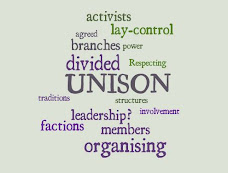With the division, and what looks like organising stagnation, in UNISON’s lay national executive (NEC) following the election of a majority running under the Time for Real Change (TFRC) ticket, it is a good time to look at what exactly lay control is, its history and how that works in partnership with the full-time structures.
It certainly wasn’t intended to centre on paying for various legal opinions to try to justify TFRC attempts to meddle with National Conference rule decisions. There may be legal loopholes but there’s also the spirit of what the supreme lay Conference intended – and Conference is the place to address that.
That of course will affect our current troubles at the top. Our lay UNISON President has just been sacked from his job and that will no doubt play out in the rules controversy and a tribunal one assumes. But difficult that is for all concerned (with members affected across the issue it seems) it doesn’t so far alter the political situation on the NEC.
No matter what the politics are, lay control surely shouldn’t be about a union of 80% women, a union that pioneered self-organisation to recognise and promote our diversity, using a TFRC ticket to replace an expected low paid woman president and most national committee chairs with white males. It’s worth remembering that some so-called ‘left’ groups historically opposed self-organisation of structurally disadvantaged groups.



